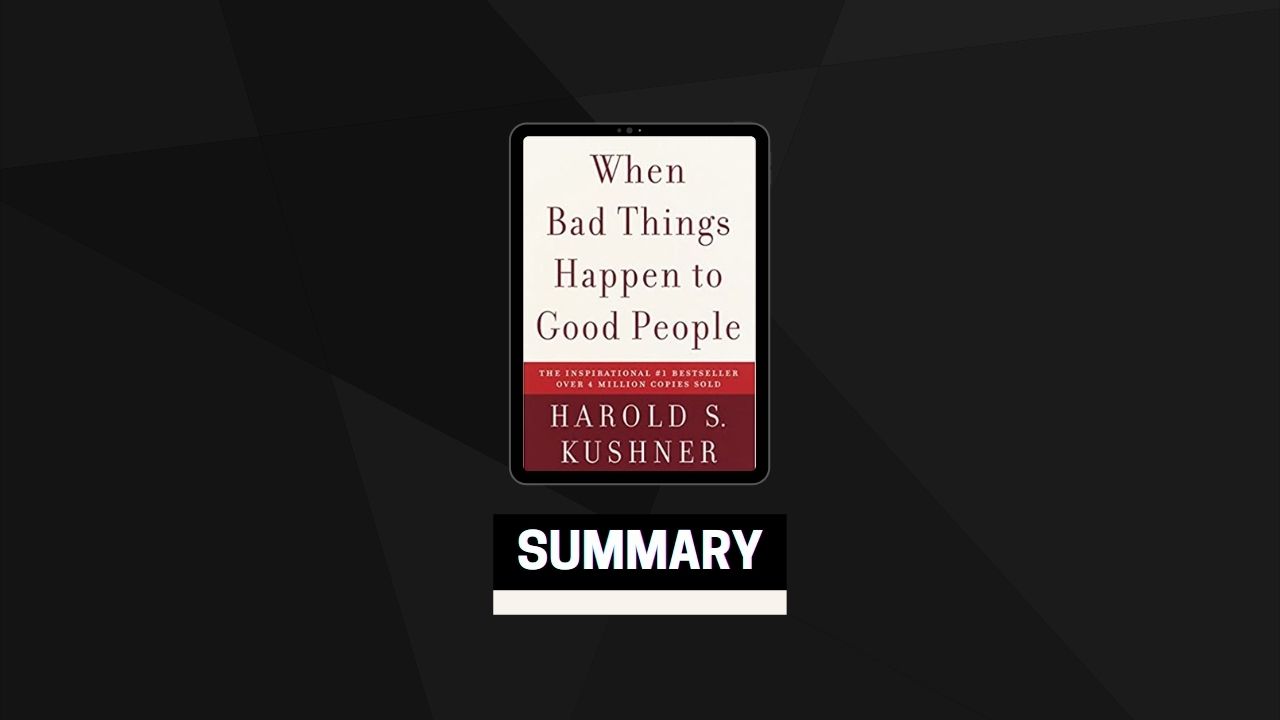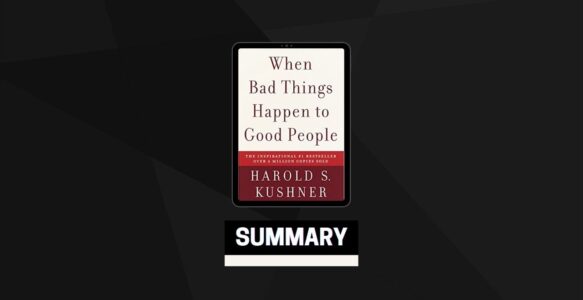Why Do the Righteous Suffer?
The misfortunes of good people are not only a problem to the people who suffer and to their families. They are a problem to everyone who wants to believe in a just and fair and livable world. They inevitably raise questions about the goodness, the kindness, even the existence of God.
make us confront this problem. We may not often find ourselves wondering, “why do totally unselfish people suffer, people who never do anything wrong?” because we come to know very few such individuals. But we often find ourselves asking why ordinary people, nice friendly neighbors, neither extraordinarily good nor extraordinarily bad, should suddenly have to face the agony of pain and tragedy. If the world were fair, they would not seem to deserve it. They are neither very much better nor very much worse than most people we know; why should their lives be so much harder? To ask “Why do the righteous suffer?” or “Why do bad things happen to good people?” is not to limit our concern to the martyrdom of saints and sages, but to try to understand why ordinary people—ourselves and people around us—should have to bear extraordinary burdens of grief and pain.
Sometimes There Is No Reason
Can you accept the idea that some things happen for no reason, that there is randomness in the universe? Some people cannot handle that idea. They look for connections, striving desperately to make sense of all that happens. They convince themselves that God is cruel, or that they are sinners, rather than accept randomness. Sometimes, when they have made sense of ninety percent of everything they know, they let themselves assume that the other ten percent makes sense also, but lies beyond the reach of their understanding. But why do we have to insist on everything being reasonable? Why must everything happen for a specific reason? Why can’t we let the universe have a few rough edges?
It may be that Einstein and the Book of Genesis are right. A system left to itself may evolve in the direction of randomness. On the other hand, our world may not be a system left to itself. There may in fact be a creative impulse acting on it, the Spirit of God hovering over the dark waters, operating over the course of millennia to bring order out of the chaos. It may yet come to pass that, as “Friday afternoon” of the world’s evolution ticks toward the Great Sabbath which is the End of Days, the impact of random evil will be diminished.
Or it may be that God finished His work of creating eons ago, and left the rest to us. Residual chaos, chance and mischance, things happening for no reason, will continue to be with us, the kind of evil that Milton Steinberg has called “the still unremoved scaffolding of the edifice of God’s creativity.” In that case, we will simply have to learn to live with it, sustained and comforted by the knowledge that the earthquake and the accident, like the murder and the robbery, are not the will of God, but represent that aspect of reality which stands independent of His will, and which angers and saddens God even as it angers and saddens us.
No Exceptions for Nice People
Our human bodies are miracles, not because they defy laws of nature, but precisely because they obey them. Our digestive systems extract nutrients from food. Our skins help to regulate body temperature by perspiring. The pupils of our eyes expand and contract in response to light. Even when we get sick, our bodies have built-in defense mechanisms to fight the illness. All these wonderful things happen, usually without our being aware of them, in accordance with the most precise laws of nature. That, not the legendary splitting of the Red Sea, is the real miracle.
But the unchanging character of these laws, which makes medicine and astronomy possible, also causes problems. Gravity makes objects fall. Sometimes they fall on people and hurt them. Sometimes gravity makes people fall off mountains and out of windows. Sometimes gravity makes people slip on ice or sink under water. We could not live without gravity, but that means we have to live with the dangers it causes.
Laws of nature treat everyone alike. They do not make exceptions for good people or for useful people. If a man enters a house where someone has a contagious disease, he runs the risk of catching that disease. It makes no difference why he is in the house. He may be a doctor or a burglar; disease germs cannot tell the difference. If Lee Harvey Oswald fires a bullet at President John Kennedy, laws of nature take over from the moment that bullet is fired. Neither the course of the bullet nor the seriousness of the wound will be affected by questions of whether or not President Kennedy was a good person, or whether the world would be better off with him alive or dead.
Laws of nature do not make exceptions for nice people. A bullet has no conscience; neither does a malignant tumor or an automobile gone out of control. That is why good people get sick and get hurt as much as anyone. No matter what stories we were taught about Daniel or Jonah in Sunday school, God does not reach down to interrupt the workings of laws of nature to protect the righteous from harm. This is a second area of our world which
h causes bad things to happen to good people, and God does not cause it and cannot stop it.
God Helps Those Who Stop Hurting Themselves
Our egos are so vulnerable, it is so easy to make us feel that we are bad people, that it is unworthy of religion to manipulate us in that way. Indeed, the goal of religion should be to help us feel good about ourselves when we have made honest and reasonable, but sometimes painful choices about our lives.
Even more than adults, children tend to see themselves as the center of their world, and to believe that their acts make things happen. They need a lot of reassurance that when a parent dies, they did not cause it. “Daddy didn’t die because you were angry at him. He died because he had an accident (or a serious sickness) and all the doctors couldn’t make him get better. We know that you loved your daddy, even if sometimes you got angry at him. We all get angry at people we love sometimes, but that doesn’t mean that we don’t love them or that we really want something bad to happen to them.”
To try to make a child feel better by telling him how beautiful it is in heaven and how happy his father is to be with God is another way of depriving him of the chance to grieve. When we do that, we ask a child to deny and mistrust his own feelings, to be happy when he really wants to be sad even as all of us around him are sad.
The child’s right to feel upset and angry, and the appropriateness of her being angry at the situation (not at the deceased parent or at God) should be recognized at a time like this.
God Can’t Do Everything, But He Can Do Some Important Things
We don’t have to beg or bribe God to give us strength or hope or patience. We need only turn to Him, admit that we can’t do this on our own, and understand that bravely bearing up under long-term illness is one of the most human, and one of the most godly, things we can ever do. One of the things that constantly reassures me that God is real, and not just an idea that religious leaders made up, is the fact that people who pray for strength, hope, and courage so often find resources of strength, hope, and courage that they did not have before they prayed.
The conventional explanation, that God sends us the burden because He knows that we are strong enough to handle it, has it all wrong. Fate, not God, sends us the problem. When we try to deal with it, we find out that we are not strong. We are weak; we get tired, we get angry, overwhelmed. We begin to wonder how we will ever make it through all the years. But when we reach the limits of our own strength and courage, something unexpected happens. We find reinforcement coming from a source outside of ourselves. And in the knowledge that we are not alone, that God is on our side, we manage to go on.
And what about your prayers?
Were they left unanswered? You faced a situation that could easily have broken your spirit, a situation that could have left you a bitter, withdrawn woman, jealous of the intact families around you, incapable of responding to the promise of being alive. Somehow that did not happen. Somehow you found the strength not to let yourself be broken. You found the resiliency to go on living and caring about things.
your desperation, you opened your heart in prayer, and what happened? You didn’t get a miracle to avert a tragedy. But you discovered people around you, and God beside you, and strength within you to help you survive the tragedy.
What Good, Then, Is Religion?
Life is not fair. The wrong people get sick and the wrong people get robbed and the wrong people get killed in wars and in accidents. Some people see life’s unfairness and decide, “There is no God; the world is nothing but chaos.” Others see the same unfairness and ask themselves, “Where do I get my sense of what is fair and what is unfair? Where do I get my sense of outrage and indignation, my instinctive response of sympathy when I read in the paper about a total stranger who has been hurt by life? Don’t I get these things from God? Doesn’t He plant in me a little bit of His own divine outrage at injustice and oppression, just as He did for the prophets of the Bible? Isn’t my feeling of compassion for the afflicted just a reflection of the compassion He feels when He sees the suffering of His creatures?” Our responding to life’s unfairness with sympathy and with righteous indignation, God’s compassion and God’s anger working through us, may be the surest proof of all of God’s reality.
Religion alone can affirm the afflicted person’s sense of self-worth. Science can describe what has happened to a person; only religion can call it a tragedy. Only the voice of religion, when it frees itself from the need to defend and justify God for all that happens, can say to the afflicted person, “You are a good person, and you deserve better. Let me come and sit with you so that you will know that you are not alone.”
None of us can avoid the problem of why bad things happen to good people. Sooner or later, each of us finds himself playing one of the roles in the story whether as victim of tragedy, as a member of the family, or as a friend-comforter. The questions never change; the search for a satisfying answer continues.


